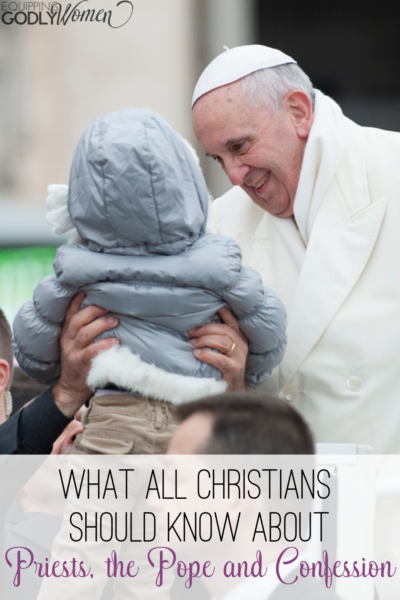What All Christians Should Know About Priests, the Pope and Confession
This post is post 7 in a series entitled Letting God Lead: My Journey Through Protestant and Catholic Beliefs. While you certainly can read this post by itself, I highly encourage you to check out the rest of the series as well. Find more about this series and a list of all of posts here. *This post contains affiliate links.
 In last week’s post, we talked about the history of Christianity and how the church spread from a small group of Jewish Christ followers throughout the ends of the world. So, how does one take the crucial message of the Gospel and spread it throughout the entire world without losing something important in the translation? Two ways: the Bible and the Church.
In last week’s post, we talked about the history of Christianity and how the church spread from a small group of Jewish Christ followers throughout the ends of the world. So, how does one take the crucial message of the Gospel and spread it throughout the entire world without losing something important in the translation? Two ways: the Bible and the Church.
About the Bible: I LOVE the Bible. I’ve read it cover to cover a few times now, I post verses around my home, I went to Bible college… Love the Bible. BUT you must remember: the church hasn’t always had the Bible. It didn’t exist in one compilation until a few centuries in, and even then, the Bible was SO expensive, most churches couldn’t afford to own the whole thing. So, how did the early Christians pass the message on? Through the church.
Read more on the proper role of the Bible in Christian history in my post: Who Has the Ultimate Authority? A Biblical Look at Sola Scriptura
[thrive_leads id=’23166′]
Catholic Church Hierarchy
Within the Catholic church– just like within all large churches and organizations–there is a hierarchy of authority. The pope is at the top, and then there are cardinals, patriarchs, bishops, priests and elders. Not only is this hierarchy extremely useful for settling doctrinal debates and for keeping the central message pure, but it dates back to the beginnings of Christianity.
In fact, in Titus 1:5, Paul writes: “For this reason I left you in Crete, that you would set in order what remains and appoint elders in every city as I directed you.” It wasn’t that a few leaders naturally just emerged. The early church purposely set up a hierarchy to help get things done. A further developed model of that same hierarchy still exists today.
Here are just a few of the New Testament verses that mention bishops, elders, overseers, etc: Acts 11:30, Acts 15:2, Acts 16:4, Phil 1:1, 1 Tim 3:2, 8, Titus 1:7. Check out this article for an in-depth look at Christian Elders in the New Testament and their roles and responsibilities.
Peter: The First Pope
Yet, of all of the Christian church leaders, none is more important or influential than the pope. It’s the pope’s job to guide the people, be a spokesperson and keep the whole operation running smoothly. Today, we have Pope Francis; the first pope was Peter, as seen in this section of Matthew 16:
13 When Jesus came to the region of Caesarea Philippi, he asked his disciples, “Who do people say the Son of Man is?”
14 They replied, “Some say John the Baptist; others say Elijah; and still others, Jeremiah or one of the prophets.”
15 “But what about you?” he asked. “Who do you say I am?”
16 Simon Peter answered, “You are the Messiah, the Son of the living God.”
17 Jesus replied, “Blessed are you, Simon son of Jonah, for this was not revealed to you by flesh and blood, but by my Father in heaven. 18 And I tell you that you are Peter, and on this rock I will build my church, and the gates of Hades will not overcome it. 19 I will give you the keys of the kingdom of heaven; whatever you bind on earth will be bound in heaven, and whatever you loose on earth will be loosed in heaven.” 20 Then he ordered his disciples not to tell anyone that he was the Messiah.
–Matthew 16:13-20
What is this Rock Jesus is Referring to?
In the original Greek, the word for Peter (in verse 18) is Petros while the word for rock is petra. Some Protestants claim that because “petros” was a word for a small stone and “petra” was a word for a large rock, that Jesus was trying to contrast the two. “You are small, but my church will be big.” However, there are a few problems with this statement.
a. The words had lost their distinction by the time this book was written, so they meant the same thing: a rock.
b. The real reason for the distinction is probably more accurately that “os” was added to Peter’s name because he was a male and “os” was the masculine inflection, while the “a” was added to the rock because it was a feminine noun and therefore needed a feminine inflection.
c. But all that is besides the point anyways since Jesus wouldn’t have been speaking in Greek anyways, but Aramic, and in Aramaic, the words are the same. So what Jesus very likely actually said was “You are Kepha and on this kepha I will build my church” — same word.
d. It doesn’t make sense that Jesus would bless Peter, call him insignificant, and then hand him the keys to the kingdom. “You are blessed. You’re an insignificant little stone. Here’s the keys to the kingdom.”
Other Protestants will say the rock Jesus was talking about what the truth Peter just spoke “You are the Messiah, the Son of the living God,” but grammatically, the “this rock” should refer back to the nearest noun (Peter).
For these reasons and others, the Catholic Church believes that the rock Jesus would build his church on was Peter. Or in other words, Peter was the first leader of the church, or pope.
What Did it Mean to Be Pope?
As the first leader of the church, Peter had an amazing amount of power and responsibility. Verse 19 says “whatever you bind on earth will be bound in heaven, and whatever you loose on earth will be loosed in heaven.” In other words, whatever Peter said goes. Woah. But… there are a few catches, as we’ll see in a minute.
Why Does the Church Believe the Pope is Infallible?
Papal infallibility is based on the following verses:
“The one who listens to you listens to Me, and the one who rejects you rejects Me; and he who rejects Me rejects the One who sent Me.” –Luke 10:16
“I will give you the keys of the kingdom of heaven; whatever you bind on earth will be bound in heaven, and whatever you loose on earth will be loosed in heaven.” –Matthew 16:19
“But when he, the Spirit of truth, comes, he will guide you into all the truth. He will not speak on his own; he will speak only what he hears, and he will tell you what is yet to come.” –John 16:13
“if I am delayed, you will know how people ought to conduct themselves in God’s household, which is the church of the living God, the pillar and foundation of the truth.” –1 Tim. 3:15
In other words, Jesus gave Peter (and the apostles, really), the authority that whatever they said would be.
It’s like if I were to hire a babysitter for my children. I’m still their mother and what I say goes. I can make new rules just by speaking them into existence and my children are obligated to obey. But if I were to hire a babysitter for my children, I would give her authority as well. She isn’t me, but she would have the power to act in the place of me while I was gone. If she said “It’s bedtime” or “You must get in your pajamas before I read stories” — those things become binding by her speaking them because I gave her that authority. And Jesus gave this same authority to the apostles–to act in place of him while he is gone.
What Does “Infallible” Mean?
Catholics believe that the pope is infallible. But the word “infallible” may not mean what you think it does. So for clarification…
1. Catholics do NOT worship the pope. He is the leader or the head of the organization, not God or divine or supreme or anything like that.
2. “Infallible” does NOT mean “sinless.” The pope is human and sins just like the rest of us.
3. The pope doesn’t have any sort of “magic powers.” He doesn’t just automatically know the right thing to do. Instead, he has to study the Scriptures, church history and previous council decisions, and rely on the Holy Spirit to hep him make the right decision.
4. Papal infallibility ONLY applies to official doctrinal declarations. That’s an incredibly important distinction that shouldn’t be overlooked. The Church doesn’t teach that the pope will never mess up, ONLY that he will never make an official doctrinal declaration in error.
5. There are restrictions.
- The pope must be making a formal declaration as the pope. He can’t just accidentally say something and it doesn’t even count if he’s teaching or writing about something in a church or in a book. It has to be official and on purpose.
- He must be speaking about faith and morals. (He can’t declare pineapple pizza the best kind).
- The decision has to be in line with Scripture and Tradition. (He can’t suddenly declare that Jesus was married.)
- The decision has to be in line with what previous church councils have decided. (He can’t declare a new canon.)
- The decision has to be logical. (He can’t declare squares circles.)
So… he’s important and he’s got a lot of power, BUT it’s not unrestrained. He can’t just go do or proclaim anything he wants.
Instances of Papal Infallibility
If I were the pope (Heaven help us all!), I’m not sure if I would be making formal declarations left and right or if I’d shy away from them altogether. Either way, Catholic popes make far less official infallible decisions than many people think.
Research papal infallibility, and you’ll find most sources say that only two official declarations have ever been made:
- In 1854, Pope Pius IX formally declared the doctrine of Immaculate Conception (That Mary was born without original sin).
- In 1950, Pope Pius XII formally declared the doctrine of the Assumption (That Mary was assumed into Heaven with both body and soul–after she died).
A few other sources will list a few more:
- In Acts 15:28, Peter declares that circumcision is not a requirement for the Gentiles.
- In 1870, the doctrine of papal infalliblity was officially declared at the first Vatican Council.
- When the pope declares someone a saint, that is supposed to be infallible as well.
Either way, it doesn’t happen often, and it usually doesn’t occur unless it is the settling of a dispute. (Catholics believe a lot of things, but they generally don’t feel the need to “declare” them to be true until they are challenged.)
**Okay, so hopefully that answers your questions on the pope! Let’s switch gears now and talk about confession for a minute.**
Why Do Catholics Confess Their Sins to a Priest?
The Catholic practice of confessing to a priest is based on the following verses:
“Again Jesus said, “Peace be with you! As the Father has sent me, I am sending you.” And with that he breathed on them and said, “Receive the Holy Spirit. If you forgive anyone’s sins, their sins are forgiven; if you do not forgive them, they are not forgiven.” –John 20:21-23
“I will give you the keys of the kingdom of heaven; and whatever you bind on earth shall have been bound in heaven, and whatever you loose on earth shall have been loosed in heaven.” –Matthew 16:19
“Therefore confess your sins to each other and pray for each other so that you may be healed. The prayer of a righteous person is powerful and effective.” –James 5:16
In other words, Jesus told the disciples that they had the power to forgive (or not forgive) sins! Why would he give it to them if he didn’t expect them to use it? And how could priests forgive or not forgive our sins if we don’t tell them what they are? Catholics confess to a priest not because they CAN’T go straight to God–they can–but because that’s how they believe God intended for things to work.
This super cute little video does a good job of explaining it:
And here’s a really handy guide to confession, so you can know exactly what happens there!
But God is the Only One Who Has the Power to Forgive Sins!
According to whom? In Mark 2:7, the Pharisees ASK: “Why does this fellow talk like that? He’s blaspheming! Who can forgive sins but God alone?” But the Pharisees asking is NOT the same as Jesus or one of the disciples declaring. To my knowledge, Jesus and the apostles don’t ever say only God can forgive sins. (If they do–please leave the verse in the comments section!!)
And anyways, this passage would have occurred BEFORE the passages in John 20 and Matthew 16… so it probably WAS true then… until Jesus also gave this responsibility to the apostles.
A Few Clarifications on Confession
- Catholics are not required to confess ALL their sins, just the major ones.
- If you legitimately forget something, you’re still forgiven; you just can’t *forget* on purpose.
- Catholics are required to confess any mortal sins at least once a year.
- These requirements don’t kick in until you reach a certain age.
- Priests CAN NOT repeat anything they heard in confession or in ANY WAY change their actions based on what they have heard.
- Priests cannot require you to confess to someone else (They can recommend it, but they can’t require it).
- When priests forgive sins, they are acting in persona Christi, or in place of Christ.
- This doesn’t mean that they ARE Christ, but that they are exercising their authority to act on his behalf, or as his ambassador.
- Priests–and even the pope–also go to confession. They can’t forgive themselves. (Well, they can, but it doesn’t “count.”)
- Those of you who have actually BEEN to confession–feel free to add more in the comments!
Benefits of Confession
Honestly–though I have yet to go myself–I’ve always liked the idea of confession.
- Confessing your sins out loud forces you to own up to them–not just ignore them.
- Also, I imagine it must make you less likely to keep doing the same sin in the future. Who wants to admit the same thing over and over again?
- It reminds you that you are a part of a community of believers–and that your sins affect others.
Catholics list a few more benefits:
- You can know for sure your sins are forgiven.
- Confessing imparts a special grace that helps you sin less in the future.
- It helps you know yourself more/identify your habitual sin patterns.
- The priest will sometimes offer you counsel or advice.
And assuming it’s not sinful (and I really don’t think it is)–why not??
Why Can’t Women Be Priests?
This article pretty much sums up any arguments I could give: Why Can’t Women Be Priests. Like it or not, the church isn’t changing its mind on this one.
But for the record, the Catholic Church doesn’t do it out of spite or disdain for women. In fact, the church calls women the “crown of creation,” and the church has FAR more women leaders in other areas than the average company. Statistically, they out-perform at promoting women, just not as priests.
Aren’t Catholic Priests a Bunch of Child Molesters?
We actually discussed this topic quite a bit in the comments section of my 10 Common Catholic Myths Critics Believe Post, so I won’t go into it in much detail here, other than to make a couple points.
1. What the church teaches and what certain members of the church do are two COMPLETELY different issues.
If the church were TEACHING people to molest or teaching that it was acceptable to molest or that it was acceptable to allow others to molest, that would be a huge problem. BUT this is NOT what the Catholic church teaches at all. Just because a few people don’t follow the rules doesn’t mean that the rules are flawed–just that the people didn’t follow them.
That’d be like saying America is a horrible country and democracy is a joke because a few people steal and kill. It’s not democracy’s fault. It’s the people’s fault.
2. Just because a few did something horrible doesn’t mean that all do.
Yes, some priests committed a horrible, horrible, shameful crime. It was absolutely inexcusable. BUT that doesn’t mean that all of the rest of the priests who were not involve deserve the same reputation.
That’d be like saying that because a few Americans kill and steal that we are ALL murderers and thieves.
And honestly, can you imagine trying to be a priest today–trying to serve God and His people–all while being accused and scorned because of a scandal you had nothing to do with? Yes, we should put the blame and responsibility where it is due–but it isn’t with the entire church or with every priest–just those who were involved in some way.
3. Priests aren’t the only ones involved in scandals like these.
Statistically, more teachers are convicted of molestation than priests. Are all teachers rapists? Hardly! Furthermore, MANY Protestant pastors, political leaders and parents are involved in crimes like these every day as well. Does that mean we’re all doomed? No, it means we’re all sinners and we all mess up sometimes–some in more horrible and public ways than others.
Okay, discussion time! What questions do you still have? What points did I miss? I’d love to hear your thoughts in the comments section below!

Enjoyed this post? Don’t miss the rest of the posts in the series!
The Day I Realized My Religion Got it Wrong
10 Common Catholic Church Myths that Critics Believe
Is the Eucharist Really Just a Symbol?
Who has the Ultimate Authority? A Biblical Look at Sola Scriptura
A Brief Look at the History of Christianity
What All Christians Should Know About Priests, the Pope and Confession
What Do Catholics Really Believe About Mary, Saints and Statues?
Infant Baptism or Believer’s Baptism? Which is Correct?
What is Purgatory? What are Indulgences?
Why Do Catholics….? Honest Answers to Your Burning Questions
Protestant and Catholic Beliefs Series Conclusion
Resources and Further Reading
I’m not asking you to believe because I say so. Please DON’T take my word for it! The purpose of this series is only to share what I’ve learned on my journey in order to inspire you to begin a journey of your own. Here are a few helpful resources to get you started.
*This post contains affiliate links, which means if you make a purchase, I may make a small commission at no additional cost to you. Thank you!
Catechism of the Catholic Church
Surprised by Truth: 11 Converts Give Biblical and Historical Reasons for Becoming Catholic by Patrick Madrid
The Catholic Church: What Everyone Needs to Know by John L. Allen
http://www.catholic.com/tracts/papal-infallibility
http://www.catholic.com/tracts/the-forgiveness-of-sins
http://catholicexchange.com/is-confession-still-an-easter-duty
http://catholicism.about.com/od/beliefsteachings/f/Did-The-Virgin-Mary-Die.htm
http://www.catholicscomehome.org/two-minute-answers/
http://www.dummies.com/how-to/content/infallibility-and-the-catholic-pope.html
http://www.goodconfession.com/five-benefits-of-frequent-confession/
http://jimmyakin.com/2004/06/two_instances_o.html
http://www.remnantnewspaper.com/Archives/2013-0402-siscoe-infallibility.htm








In order to be a Catholic you need to complete the Sacraments. Let’s start with Baptism, you have to be baptized Catholic. The Catechism book teaches that Initial Justification is by means of Baptism [1262-1274}. The Bible teaches that Justification is by Faith Alone [Romans 3:28]. The Catechism book teaches justification is furthered by sacraments and good works [1212,1392,2010]. The Bible teaches justification is the perfect righteousness of God [2 Corinthians 5:21]. In Christ the believer is made complete [Colossians 2:10]. The Catechism book teaches that salvation is attained by cooperating with grace through faith, good works, and participation in the sacraments [183,1129,1815,2002]. The Bible teaches that salvation is attained by grace through faith apart from works [Ephesians 2:8,9]. Good works are the result, not the cause, of salvation (Ephesian 2:10). The Catechism book teaches that the sacraments are necessary channels for the continual infusion of grace. They bestow grace in virtue of the rite performed [1127-1129]. The Bible teaches that the Child of God is the constant object of the Father’s grace [Romans 5:1,2]. The Catechism book teaches that serious sins must be confessed to a priest [1456-1457}. The Bible teaches that sin is to be confessed directly to God [Ezra 10:11]. The Catechism book teaches that purgatory is necessary to atone for sin and cleanse the soul [1030-1031]. The Bible teaches that purgatory does not exist. Jesus made purification for sins on the cross [Hebrews 1:3]. Another issue is praying to the saints.
Hi, Apryl!
Actually, the Bible does NOT say that we are saved by faith alone. If you check out Romans 3:28 (the verse you quoted), the word “alone” is never mentioned. The only place the word “alone” is mentioned is in James 2, where it actually says “You see that a person is justified by works and not by faith alone.” I actually delve into this topic much deeper in my post Is Faith Alone Enough? I really hope you will check it out! It isn’t based on what this denomination or that denomination says, but what the Bible actually says.
I have posts on many of the other issues you bring up too (you can find the whole list here: Letting God Lead: My Journey Through Catholic and Protestant Belief), but I think the “faith alone” one is a great place to start 🙂
The verse doesn’t say “alone”, it says “apart” (ESV). So Here is a great explanation of why faith alone saves. If you have true faith in the Lord you will produce “good works”. You don’t need the “works” to save you. Your true faith in the Lord will reflect that.
http://www.gotquestions.org/salvation-faith-alone.html
Well, honestly, we’re both going by translations until we can read the original language… (how I wish I could!!). I definitely agree that works will come naturally as a result of faith, but, my issue is only in the “faith ALONE” argument–that you would be fine to just believe without ever even once beginning to act like it or changing your life in any way. Did you have a chance to look over the link I sent you? It explains it in greater detail.
I had the chance to read your article about faith alone. It is true that works can’t earn you salvation. It’s really God’s call. We can go back and forth but won’t really know the truth until we are with the Lord. God see’s the big picture, we don’t. My biggest concern with concern with Cathothism is that many depend on what they are taught through church and never read the bible for themselves. They rely on the priest to relay God’s Word. As you’ve said in a prior post, the priest isn’t perfect. Why would you want to have that kind of leader when you can go directly to Jesus? I listen to a pastor speak but by no means go off his word. I read the bible myself.
“My biggest concern with concern with Catholicism is that many depend on what they are taught through church and never read the bible for themselves” — That is definitely a cause for concern. It’s not necessarily a “Catholic” problem, though. The church certainly doesn’t teach people NOT to read the Bible. They encourage people to read the Bible for themselves, and honestly, Catholics read more Scripture at Mass than Protestants do at church. So there is plenty of opportunity. If people don’t–it’s just out of laziness on the individual’s part, not really the church’s fault.
And furthermore, there are plenty of Protestants who don’t read their Bibles either, who just believe what their Pastor tells them. Or people who do read their Bible themselves, but completely misinterpret it because they are reading it through a modern day lens and completely missing all of the rich history and meaning that the first century people would have picked up on. (I think we are ALL guilty of that more often than we know!)
For more on, “Why not just read the Bible myself,” you should definitely check out my post on that: Who Has the Ultimate Authority? A Biblical Look at Sola Scriptura. It may just bring up some points you hadn’t thought of before 🙂
Love this entry!! And I’m so grateful for the gift of Reconciliation!! While it can be intimidating from a human standpoint, from a Divine standpoint, it really is a direct connection to Christ, His forgiveness, and His grace. Also, the absolution administered by the Priest through the sacrament confirms what is promised in Psalm 103:12. (A Priest actually referred me to that Psalm while I was in Confession, and it has become a favorite verse of mine.)
That’s a great verse! And perfect for confession!